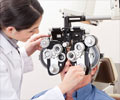The newly framed guidelines calls for evidence-based screening schedule is based on the presence and severity of retinopathy and their HbA1C levels.

‘The new individualized schedule would result in earlier detection of advanced retinopathy that requires treatment to save vision compared with annual exams, while at the same time reducing the frequency of eye exams.’





To develop the new screening suggestions, researchers analyzed about 24,000 retinal exams obtained over three decades from about 1,400 participants in the Diabetes Control and Complications Trial and its follow-up, the Epidemiology of Diabetes Interventions and Complications study (DCCT/EDIC). "The results could save money and time while getting better health outcomes -- a win all around," said Dr. Catherine Cowie, who oversees DCCT/EDIC at the NIH's National Institute of Diabetes and Digestive and Kidney Diseases, the study's primary funder.
"The findings from this landmark type 1 diabetes study will inform a precision medicine approach, where treatment is tailored to the individual."
Several major medical groups currently recommend routine yearly eye exams, starting after three to five years of diabetes duration, for people with type 1 diabetes, a condition where the body does not make insulin.
Diabetic retinopathy occurs when diabetes damages the light-sensitive tissue in the back of the eye. Diabetic retinopathy is the leading cause of blindness among working-age adults.
Advertisement
- With no retinopathy, every four years
- With mild retinopathy, every three years
- With moderate retinopathy, every six months
- With severe retinopathy, every three months
Overall, researchers found the new, individualized schedule would result in earlier detection of advanced retinopathy that requires treatment to save vision compared with annual exams, while at the same time reducing the frequency of eye exams.
Advertisement
"This new evidence-based screening schedule is based on taking photographs of the back of the eye, rather than physical examination with an ophthalmoscope. Retinal photography is a commonly used and widely available method to detect eye disease and is thought to be more accurate than only the physical exam in detecting diabetic eye disease," said Dr. David M. Nathan, the DCCT/EDIC study chair and the paper's first author.
"Further studies are needed to learn if the newly proposed screening strategy applies to type 2 diabetes." Nathan directs the Diabetes Center at Massachusetts General Hospital, Boston.
"The next step is for the findings to be discussed and potentially incorporated into medical guidelines for care of people with type 1 diabetes," Cowie said.
"For more than 30 years, the federal government, researchers, and participants have partnered to improve the lives of all people with diabetes through DCCT/EDIC. These results are just the latest example of the vast impact of their service and of medical research to improve public health," said NIDDK Director Dr. Griffin P. Rodgers.
Source-Eurekalert















